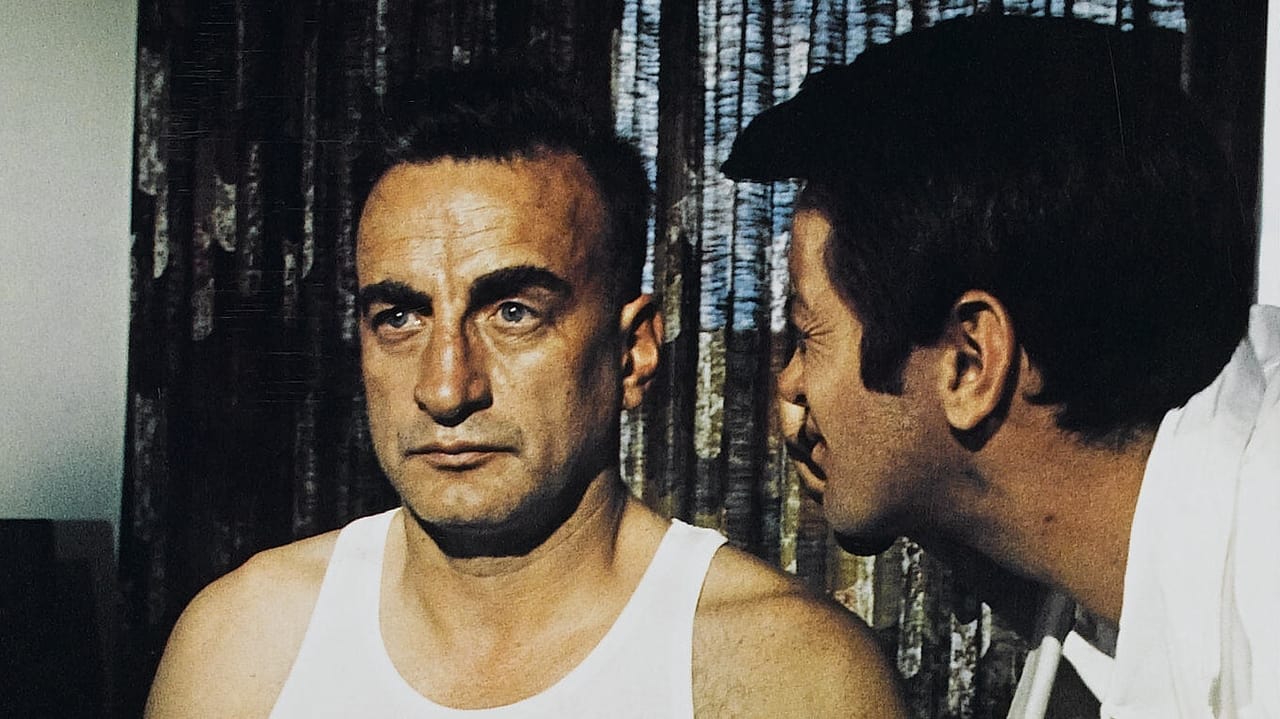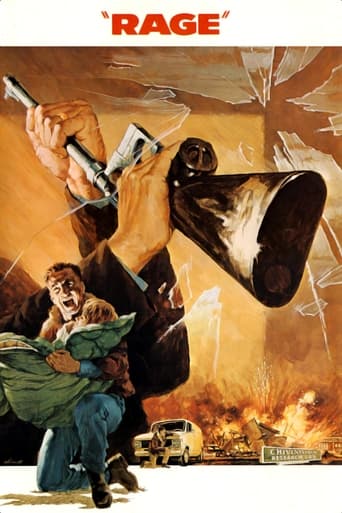Sexylocher
Masterful Movie
PlatinumRead
Just so...so bad
SparkMore
n my opinion it was a great movie with some interesting elements, even though having some plot holes and the ending probably was just too messy and crammed together, but still fun to watch and not your casual movie that is similar to all other ones.
Cristal
The movie really just wants to entertain people.
nadase
This film, as did a lot of 70's films, works best at the symbolic level. When I finished watching this, I felt director Scott had tried to channel Italian director Antonioni ("L'avventura," "Blowup," etc.). This is a courageous move, as this is billed as an action-revenge movie, a genre which tends not to require too much mental engagement from the viewer but the willingness to get to the cheap-thrill roller-coaster ride. As a three-act screenplay, its effect is much more subtle. It actually may be said that this is an anti-action film due to its subtle character development dynamic. The faces carry it, the dialogue contributes very little. I won't spoil the movie much as most reviewers have already disclosed the critical plot-points. Logan, a loving and friendly widower, raises his son--as God would raise his own son--in his image to love nature and love animals (interestingly, the otherwise dreary Tom Laughlin film, "Born Losers" opens with similar wide-open-spaces, "Adam-in-nature" imagery). The opening shot of the camera coming down from heavenly clouds to a bucolic, edenic earth says it all. We're foreshadowed "wrath-of-God-unto-the-unrighteous" stuff here. The father-son relationship is conveyed via images rather than through dialogue. The latter serves to characterize, rather heavy-handedly, the heavies from the quietly burgeoning military-industrial complex (more on this below). The dad watches over his son, patiently and indulgently teaches him how drive a stick (try teaching someone sometime in _your_ car and note how aggravating, if not damaging to your gearbox, the process is!), and his bond with his dog is evident. The dog, Lassie-like, abides by one of Logan's words! So, this guy is even a friend to animals... The plot takes off when Logan and son go in for some overnight, father-son bonding-camping. Absolutely, there exist credibility gaps in the plot. Is Logan a bit denser that most of us? His IQ, reasoning process is never established. His heart, big as all Wyoming outdoors, is. He is a tender, trusting human being, perhaps one not given to cold rational thinking(unlike the calculating heavies), but one whose mind appears dedicated to raising his son in a bucolic, wholesome environment. Enter the US Army and its CYA thinking. This is an institution we have been bred to trust to _protects us_, like a loving, trusted father (get where this is going?) Two worldviews collide. Logan allows himself to believe what he wants to believe. He even trusts Dr. Holliford's (Martin Sheen) Army-led medical team, which eventually begins to sedate him. Only Logan's long-time friend, the family doctor, Dr. Caldwell, portrayed by long-time veteran, Richard Basehart, watches out for Logan. The conspiracy of silence expands as even the Health Department doctor, Dr. Spencer, gets co-opted to lie to Logan about his condition and his son's death. The slow disintegration of trust ends when Logan finds his son's corpse in the hospital morgue. A slow rage due to betrayal begins to simmer. Logan strikes back the only way he knows how. The careless killing of Spencer's cat foreshadows Logan's loss of love for animals (eventually men), a behavior learned from his new nemesis, the MI-Complex. Logan goes on a blind, rage-fueled destruction and killing spree. The MI Complex has nothing on him. Logan has quickly learned to kill arbitrarily, security guards, policemen, sentries--whomever stand in his way. Even innocent, caged animals die by his hand--the very same victims of the MI Complex. Logan, as Nietzsche warned, has become just like his enemy... It all comes to naught as we, and he, learn. There really was nothing to destroy. It's a _worldview_ Logan took on. He comes to understand that the MIC's nihilism has transformed him into a spiteful killing machine and spares a truck-drivers life. He no longer fires at anyone in the base. He waits to die a painful death. The man of nature (God?) is dead. His long-time friend left, Dr. Caldwell remains, grieving. Basehart's face says it all... Overall, I did not know whether the flaws in this film were due to a lack of rewrites in the script, or too many. Wish I could read it to compare to the film. Scott has an interesting directing style, but definitely not one that fits the Hollywood formula. The clever camera-work "edits" in the early father-son scenes mystified me. They brought too much attention to themselves and added little to the narrative. One reviewer complained about the lighting. I find that hard to believe--as the noir style and in one sequence Logan walking into the darkness as his character sinks into nihilism and rage adds so much to the narrative and character development. Even Lalo Schifrin's clichéd, corny, bucolic harmonica in the opening sheep-farm scenes invites us into Logan's, un-thinking, all-feeling, clichéd Americana, "one-with-nature-in-the-farm" world--one that will soon perish, destroyed by you know who... Be well.
dougdoepke
While camping out, a Wyoming sheep rancher and his son are accidentally sprayed with a secret poison. The boy dies while the military covers up its mistake, enlisting civilian personnel in the cover-up. But will the father find out, and if so, what will he do. It's important to keep in mind that the screenplay is based on a true 1968 occurrence. The Pentagon covered up poisonous contamination of several thousand sheep in Utah, and only admitted it after overwhelming evidence. I assume they were wary of being seen experimenting with poisonous chemical at a time when the Vietnam War was going badly. The movie itself is very methodical. The first part dealing with the cover-up shows how deception is spread among medical and military professionals. Surprisingly, however, no higher justifications such as national security are cited. It's more like an embarrassment than a security breach. Anyway, Scott really low-keys it throughout, being good-citizen cooperative even as he's fed one lie after another about his son. Even after he finds out the truth, his rage is more intense than histrionic. I guess I was expecting him to explode in the scary way that only he can. Apparently, the actor wasn't happy with his performance (TCM), blaming it on his divided roles as both director and lead performer. All in all, the movie's like a slow fuse being lit until it finally goes off. Just how sane Logan (Scott) is during those climactic moments is, of course, anybody's guess. Considering what's happened to him, his actions are understandable, if not excusable (innocents die). At the same time, the lessons are, if anything, more relevant now than then, especially with the rise of our national security state and its mass surveillance program. (In passing—this is one of the few films I've seen to actually portray death throes as the person expires. Kudoes to Scott for including such a disturbing detail that traditional Hollywood avoided like the plague. More of that and audiences might take a different view of movie violence.)
Scott LeBrun
The legendary actor George C. Scott's theatrical directing debut is a decent revenge tale, one with some flaws, but it's still a slick, professionally made, and reasonably compelling yarn. Scott plays Dan Logan, a nice guy farmer out camping with his son Chris (Nicolas Beauvy) when they are accidentally exposed to a nerve gas that the Army was testing. It becomes clear that all the military wants to do is cover up the incident, and keep Dan in the dark, even when Chris dies. And naturally, once Dan learns the ugly reality of the whole situation, he determinedly seeks brutal revenge. Scott, working from a screenplay by Philip Friedman and Dan Kleinman, knows how to reel us in, with an extended pre-credits sequence serving up some heartwarming father and son bonding and then introducing the element of the nerve gas. Scott occasionally goes for some stylistic touches, particularly when it comes to slow motion, but mostly just sticks to telling the story in a straightforward manner, taking advantage of the Panavision aspect ratio in the way people and things are arranged in the frame. Fred J. Koenekamp does the beautiful cinematography and Lalo Schifrin supplies a wonderful music score. Now, it should be very easy to sympathize with Logan and root for him to hold the Army accountable, and it is at first, but his descent into cold blooded murder and nastiness is a pretty abrupt one, making it hard to really be on his side the entire time. Also, the authorities striving to keep things quiet do slip up more than once, which is rather contrived considering all the steps one would think they would be taking. And a key moment where Logan learns the truth about his own fate is not shown on screen and one would have to wonder why it would be left out. In any event, Scott keeps this watchable throughout, delivering a quietly intense performance and not resorting to much in the way of histrionics. He also ably directs a top notch supporting cast including Richard Basehart (very warm as Logan's physician and old friend), Martin Sheen, and Barnard Hughes, with familiar folk such as Stephen Young, Kenneth Tobey, Robert Walden, William Jordan, Dabbs Greer, John Dierkes, Lou Frizzell, and Ed Lauter in smaller roles. Overall, even with its flaws it's still pretty entertaining. Six out of 10.
G-Man-25
George C Scott stars and makes his directorial debut in this tense but ultimately pointless drama about a peaceful rancher who goes on a rampage of revenge after a botched military nerve-gas experiment conducted over his land leads to the death of his young son. You can feel Scott's character's frustration as he's lied to and stone-walled from every angle by the military bureaucrats who want to cover up the incident. Scott knows how to keep things moving and shows some stylish touches in the director's chair, but he can't keep the ending from being disappointing and unsatisfying. Still, all said, it's a fairly absorbing ride while it lasts. It's a movie that will likely stay with you long after the end credits roll.

